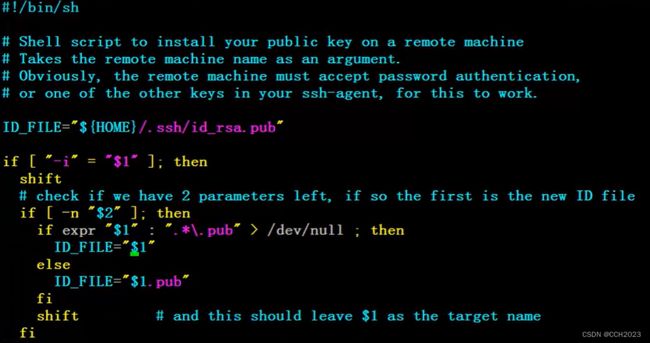- sbatch: error: Batch script contains DOS line breaks (\r\n)
爱听许嵩歌
编程debug问题batchmatlabslurm
问题:在使用超算时,提交脚本出现batch:error:BatchscriptcontainsDOSlinebreaks(\r\n)sbatch:error:insteadofexpectedUNIXlinebreaks(\n)原因:dos下的换行和Unix是不一样的:windows中\r\n表示换行,linux等使用\n换行。差异:Windows系统下文本文件的换行符是:回车+换行CR/LF即\
- 探索Python性能优化的新里程:py-spy
施刚爽
探索Python性能优化的新里程:py-spy项目介绍py-spy是一个为Python程序设计的轻量级采样剖析器,它无需重启或修改你的代码就能让你看到程序运行时的时间分配情况。由于其采用Rust编写,因此在不影响目标程序运行的情况下,py-spy能安全地对生产环境中的Python代码进行剖析。该项目支持Linux、macOS、Windows和FreeBSD上的所有现代CPython解释器版本(从2
- SCP命令传输文件
惟余惟余
运维
SCP进行文件传输一、基本语法:二、具体用法1.从本地将文件传输到服务器2.从本地将文件夹传输到服务器3.将服务器上的文件传输到本地4.将服务器上的文件夹传输到本地一、基本语法:Linuxscp命令用于Linux之间复制文件和目录。scp概述:scp是securecopy的缩写,scp是linux系统下基于ssh登陆进行安全的远程文件拷贝命令。scp与rcp的区别:scp是加密的,rcp是不加密的
- 第七弹:C语言基础--标准IO编程详解
三玖诶
CC语言标准IO编程
目录文章目录知识点1文件的概述1文件的定义2Linux系统中的文件定义3Linux系统中文件的访问3.1文件缓冲区概述3.2文件缓冲区具体形式4磁盘文件分类4.1磁盘文件分类说明4.2文本文件和二进制文件的区别知识点2标准IO库1FILE文件指针1.1FILE指针的概述1.2FILE结构体数据类型的定义1.3FILE指针的管理1.4FILE指针的分配2文件的IO操作2.1打开文件流-fopen2.
- 【linux安装git+配置gitlab+推送】
hi+
gitlinuxgitlab
【安装】$sudoaptupdate$sudoaptinstallgit$git--version【配置】A:安装Git之后,您需要做的第一件事就是配置您的git用户名和电子邮件地址。Git将您的身份与您所做的每次提交相关联。要设置全局提交名称和电子邮件地址,请运行以下命令:zly@ubuntu:~$gitconfig--globaluser.name"git用户名"zly@ubuntu:~$gi
- Linux C语言中的IO--标准IO
ぃ未来可期
Cc语言linux
文章目录1.IO概述系统调用和库函数有什么区别?2.标准IO2.1缓冲区/缓存区行缓冲区刷新方法全缓冲区刷新方法2.2文件指针2.3标准IO常用函数fopen()fclose()perror()errnofgetc()fputc()feof()/ferror()判断返回值EOF类型ungetc()将字符放回输入流fgets()fputs()fprintf()/sprintf()/dprintf/s
- c语言标准io库,IO之标准C库buffer
抬杠小天才
c语言标准io库
在论述这个主题之前,先介绍一下标准C库和linux系统调用以及windowsAPI之间的关系。拿写文件来举个例子linux下写文件用write()windows下写文件用WriteFile()这说明不同操作系统实现同样的系统功能的接口应该是不一样的。造成这种现状是操作系统发展的历史原因造成的,无法在操作系统的层面统一系统函数接口。同样功能的程序在linux上写一套,windows上又得写另外一套,
- Linux--标准IO库
Ao_Richard
应用编程Linux算法
一、标准IO简介所谓标准I/O库则是标准C库中用于文件I/O操作(譬如读文件、写文件等)相关的一系列库函数的集合,通常标准I/O库函数相关的函数定义都在头文件中,所以我们需要在程序源码中包含头文件。标准I/O库函数是构建于文件I/O(open()、read()、write()、lseek()、close()等)这些系统调用之上的,譬如标准I/O库函数fopen()就利用系统调用open()来执行打
- k8s包管理器helm_K8S集群 Helm 包管理
weixin_39872893
k8s包管理器helm
Helm是一个Kubernetes的包管理工具,就像Linux下的包管理器,如yum/apt等,可以很方便的将之前打包好的yaml文件部署到kubernetes上。k8s之前部署要写很多的yaml文件,大型应用部署起来比较麻烦,于是helm就出现了。Helm有两个重要概念:helm:一个命令行客户端工具,主要用于Kubernetes应用chart的创建、打包、发布和管理。Chart:应用描述,一系
- centos linux lvm分区,linux CentOS/redhat 6.5 LVM分区使用详解
文韬菌
centoslinuxlvm分区
1,介绍LVM是逻辑盘卷管理(LogicalVolumeManager)的简称,它是Linux环境下对磁盘分区进行管理的一种机制,LVM是建立在硬盘和分区之上的一个逻辑层,来提高磁盘分LVM区管理的灵活性。前面谈到,LVM是在磁盘分区和文件系统之间添加的一个逻辑层,来为文件系统屏蔽下层磁盘分区布局,提供一个抽象的盘卷,在盘卷上建立文件系统。物理卷(physicalvolume)物理卷就是指硬盘分区
- linux /unix/centos/ubuntu/redhat命令详解
UNIX概述•UNIX历史•UNIX特点•UNIX原则UNIX历史•UNIX操作系统诞生于60年代末期的Bell实验室•美国电话电报公司(AT&T)在70年代中期开始发行UNIX的非商业许可证•从70年代末开始在市场上出现了不同的UNIX商品化版本UNIX特点•可靠性高•伸缩性强•开放性好•植根于网络•面向数据库使用UNIX基本原则•所有对象,包括硬件都是文件•配置数据以文本形式保存•由短小的单目
- Kubernetes 集群简介 部署搭建 及常用命令
GHY@CloudGuardian
Kuberneteskubernetes容器云原生运维linux
Kubernetes集群简介Kubernetes(简称K8s)是一个开源的容器编排平台,用于自动化容器化应用的部署、扩展和管理。它为容器提供了一个完整的管理框架,帮助开发者和运维团队在大规模环境中高效地部署和管理应用。Kubernetes集群是由多个组件组成的,主要包括控制平面和工作节点。集群的核心目的是确保容器化应用的高可用性、可扩展性、负载均衡、自动化部署等功能。Kubernetes集群的基本
- 【云原生】Helm来管理Kubernetes集群的详细使用方法与综合应用实战
景天科技苑
云原生K8S零基础到进阶实战云原生kubernetes容器Helmk8sk8s集群
✨✨欢迎大家来到景天科技苑✨✨养成好习惯,先赞后看哦~作者简介:景天科技苑《头衔》:大厂架构师,华为云开发者社区专家博主,阿里云开发者社区专家博主,CSDN全栈领域优质创作者,掘金优秀博主,51CTO博客专家等。《博客》:Python全栈,前后端开发,小程序开发,人工智能,js逆向,App逆向,网络系统安全,数据分析,Django,fastapi,flask等框架,云原生k8s,linux,she
- k8s学习 — (运维)第九章 Helm 包管理器
2401_83740189
2024年程序员学习运维linux面试
网上学习资料一大堆,但如果学到的知识不成体系,遇到问题时只是浅尝辄止,不再深入研究,那么很难做到真正的技术提升。需要这份系统化的资料的朋友,可以点击这里获取!一个人可以走的很快,但一群人才能走的更远!不论你是正从事IT行业的老鸟或是对IT行业感兴趣的新人,都欢迎加入我们的的圈子(技术交流、学习资源、职场吐槽、大厂内推、面试辅导),让我们一起学习成长!config包含了可以合并到打包的chart中的
- 详解Linux(Ubuntu/RedHat/CentOS)及国产服务器统一加域管理方案
本期内容将通过一个实际案例讲清楚数据中心服务器身份认证场景的痛点及宁盾身份域管在其中的作用和价值。很多行业,像金融、运营商,还有那些关系国计民生的服务单位,均会受到监管制度统一要求,对数据中心的服务器执行定期修改口令、统一身份认证和MFA多因素认证。另外,等保、密评同样要求对服务器运维进行安全管控。但一般数据中心服务器规模较大,存在各种管理乱象,如:1.各种Linux,如Ubuntu、Redhat
- K8S的Helm包管理器
程序员Rocky
运维DevOpsk8skubernetesdocker容器helmhelm安装包
一、背景官网:https://helm.sh/我们针对K8S环境中,部署对应的应用,无外乎就是编写一堆yaml资源清单文件.资源清单、依赖性少的时候,可以直接手动维护。但是,随着资源清单越来越复杂,越来越多,不同的环境切换不同的资源清单配置,如果还是手动维护,那将会是一场运维灾难。没有Helm之前的问题:1、手动管理YAML文件:需要手动编写和维护大量YAML文件,容易出错2、缺乏标准化:各团队有
- 面试经验分享 | 成都某安全厂商渗透测试工程师
更多大厂面试题看我的主页或者专栏找我免费领取目录:所面试的公司:某安全厂商所在城市:成都面试职位:渗透测试工程师岗位面试过程:面试官的问题:1.平常在学校打CTF嘛,获奖情况讲下,以及你自己的贡献如何?2.内网渗透主要思路说一下吧?3.web打点过程中有没有遇到过waf?怎么绕过的4.现在给你一个站你会怎么做信息搜集?5.如何快速检测定位网站目录下的webshell呢?6.简单讲下反弹shell的
- 〖Python 数据库开发实战 - Redis篇②〗- Linux系统下安装 Redis 数据库
哈哥撩编程
#⑤-数据库开发实战篇Python全栈白宝书python数据库数据库开发实战linux安装redis
订阅Python全栈白宝书-零基础入门篇可报销!白嫖入口-请点击我。推荐他人订阅,可获取扣除平台费用后的35%收益,文末名片加V!说明:该文属于Python全栈白宝书专栏,免费阶段订阅数量4300+,购买任意白宝书体系化专栏可加入TFS-CLUB私域社区。福利:加入社区的小伙伴们,除了可以获取博主所有付费专栏的阅读权限之外,还有机会加入星荐官共赢计划,详情请戳我。作者:不渴望力量的哈士奇(哈哥),
- 从0到1:Maven下载安装与配置全攻略
目录一、Maven是什么二、为什么需要Maven2.1依赖管理难题2.2构建过程的复杂性三、下载Maven3.1下载前准备3.2下载步骤四、安装Maven4.1解压安装包4.2移动Maven文件夹(可选,Linux适用)五、配置Maven5.1配置环境变量5.2验证安装5.3配置本地仓库5.4配置远程仓库(可选)六、总结一、Maven是什么Maven是一个跨平台的项目管理工具,主要服务于基于Jav
- CentOS7下Systemctl详解
JerryAi
一、Systemd简介Systemd是由红帽公司的一名叫做LennartPoettering的员工开发,systemd是Linux系统中最新的初始化系统(init),它主要的设计目的是克服SysV固有的缺点,提高系统的启动速度,systemd和upstart是竞争对手,ubantu上使用的是upstart的启动方式,centos7上使用systemd替换了SysV,Systemd目录是要取代Uni
- 【Linux学习】Ubuntu对用户进行管理
Small___ming
Linuxlinuxubuntu用户管理
目录写在前面【Linux学习】Ubuntu对用户进行管理一、为什么需要用户管理?二、用户管理基础操作(一)用户管理1.用户管理命令表格2.关键操作场景说明场景一:创建用户并配置权限场景二:修改用户属性场景三:设置密码策略场景四:锁定并删除用户3.配置文件说明4.注意事项5.其他问题(1)新创建的用户目录在哪里?(2)多硬盘服务器如何指定用户目录?方法一:创建用户时直接指定路径方法二:挂载硬盘到`/
- 运维打铁: Ruby 脚本在运维自动化中的应用探索
懂搬砖
运维打铁原力计划运维ruby自动化
文章目录一、思维导图二、基础介绍1.Ruby语言特点2.运维自动化概念三、应用场景1.服务器配置管理2.定时任务执行3.日志分析处理四、代码示例1.服务器配置脚本2.定时任务脚本3.日志分析脚本五、优势与挑战1.优势2.挑战六、总结与展望一、思维导图Ruby脚本在运维自动化中的应用基础介绍应用场景代码示例优势与挑战总结与展望Ruby语言特点运维自动化概念服务器配置管理定时任务执行日志分析处理服务器
- 运维打铁: Shell 脚本自动化任务编写与优化
懂搬砖
运维打铁原力计划运维ruby自动化
文章目录思维导图一、基础编写1.变量与数据类型2.控制结构if-else语句for循环3.函数定义二、高级特性1.正则表达式2.文件处理3.远程操作三、性能优化1.代码结构优化2.资源管理3.并发处理总结思维导图Shell脚本自动化任务编写与优化基础编写高级特性性能优化变量与数据类型控制结构函数定义正则表达式文件处理远程操作代码结构优化资源管理并发处理一、基础编写1.变量与数据类型在Shell脚本
- Qualcomm Linux 蓝牙指南学习--概述
专业开发者
蓝牙linux学习运维
前言QualcommTechnologies推出的Linux蓝牙指南详细介绍了基于QualcommRB3Gen2和IQ-9100Beta开发套件的蓝牙解决方案。该文档涵盖BlueZ和Fluoride协议栈的功能验证流程,支持蓝牙5.2核心规范,包括WCN6750/WCN6856/QCA6698AQ芯片组的特性。主要内容分为三部分:1.功能架构支持GAP、SPP、A2DP等10种蓝牙Profil
- Qualcomm Linux 蓝牙指南学习--入门指南
专业开发者
蓝牙linux学习运维
前言QualcommTechnologies推出的Linux蓝牙指南详细介绍了基于QualcommRB3Gen2和IQ-9100Beta开发套件的蓝牙解决方案。该文档涵盖BlueZ和Fluoride协议栈的功能验证流程,支持蓝牙5.2核心规范,包括WCN6750/WCN6856/QCA6698AQ芯片组的特性。主要内容分为三部分:1.功能架构支持GAP、SPP、A2DP等10种蓝牙Profil
- Xshell使用可以使用一条命令操作三台虚拟机命令窗口操作
printf200
Xshell6选择查看-->撰写-->撰写栏-->选择全部会话:如下图在这里插入图片描述在这里插入图片描述在这里插入图片描述点击选择全部会话即可
- 【RK3568 嵌入式linux QT开发笔记】 二维码开源库 libqrencode 交叉静态编译和使用
本文参考文章:https://blog.csdn.net/qq_41630102/article/details/108306720参考文章有些地方描述的有疏漏,导致笔者学习过程中,编译的.a文件无法在RK3568平台运行,故写本文做了修正,以下仅是自我学习的笔记,没有写的很详细。一:下载软件包https://download.csdn.net/download/qq_41630102/12781
- 如何通过linux黑窗口实现对远程服务器的操作
①选择合适的云平台进行设备的租用并复制好远程设备的IP地址②使用管理员权限打开黑窗口③输入命令连接远程的设备:ssh用户名@服务器IP地址,此时得到的是一个什么都没有的设备④由于该设备什么都没有,故先:sudoaptupdate,然后安装gcc编译器:sudoaptinstallbulid-essential,再然后安装python:sudoaptinstallpython-3.8,再然后安装mi
- 19c补丁-20250715发布的19.28补丁的校验码
bestsun999
Oracle_19coracle数据库linux
Patch6880880:OPatch12.2.0.1.47forDB19.0.0.0.0(Jul2025)OPatch12.2.0.1.47forDB19.0.0.0.0(Jul2025)(Patch)p6880880_190000_Linux-x86-64.zip69.5MB(72847006bytes)SHA-10F709DB263D031393086EC55F6D5270A73DE509D
- 达梦数据库运维-DM8到ORACLE11g创建DBLINK
DM8到ORACLE11g创建DBLINK一、安装Oracle11g客户端安装配置1)解压安装客户端进入/dm/创建oracle客户端目录mkdir-p/dm8/oracleclient/chowndmdba.dinstall-R/dm8/oracleclient/cd/dm8/oracleclient/tar-xvfdbclt11204_x64_RHEL7U4_x64.tar.gz2)将orac
- 集合框架
天子之骄
java数据结构集合框架
集合框架
集合框架可以理解为一个容器,该容器主要指映射(map)、集合(set)、数组(array)和列表(list)等抽象数据结构。
从本质上来说,Java集合框架的主要组成是用来操作对象的接口。不同接口描述不同的数据类型。
简单介绍:
Collection接口是最基本的接口,它定义了List和Set,List又定义了LinkLi
- Table Driven(表驱动)方法实例
bijian1013
javaenumTable Driven表驱动
实例一:
/**
* 驾驶人年龄段
* 保险行业,会对驾驶人的年龄做年龄段的区分判断
* 驾驶人年龄段:01-[18,25);02-[25,30);03-[30-35);04-[35,40);05-[40,45);06-[45,50);07-[50-55);08-[55,+∞)
*/
public class AgePeriodTest {
//if...el
- Jquery 总结
cuishikuan
javajqueryAjaxWebjquery方法
1.$.trim方法用于移除字符串头部和尾部多余的空格。如:$.trim(' Hello ') // Hello2.$.contains方法返回一个布尔值,表示某个DOM元素(第二个参数)是否为另一个DOM元素(第一个参数)的下级元素。如:$.contains(document.documentElement, document.body); 3.$
- 面向对象概念的提出
麦田的设计者
java面向对象面向过程
面向对象中,一切都是由对象展开的,组织代码,封装数据。
在台湾面向对象被翻译为了面向物件编程,这充分说明了,这种编程强调实体。
下面就结合编程语言的发展史,聊一聊面向过程和面向对象。
c语言由贝尔实
- linux网口绑定
被触发
linux
刚在一台IBM Xserver服务器上装了RedHat Linux Enterprise AS 4,为了提高网络的可靠性配置双网卡绑定。
一、环境描述
我的RedHat Linux Enterprise AS 4安装双口的Intel千兆网卡,通过ifconfig -a命令看到eth0和eth1两张网卡。
二、双网卡绑定步骤:
2.1 修改/etc/sysconfig/network
- XML基础语法
肆无忌惮_
xml
一、什么是XML?
XML全称是Extensible Markup Language,可扩展标记语言。很类似HTML。XML的目的是传输数据而非显示数据。XML的标签没有被预定义,你需要自行定义标签。XML被设计为具有自我描述性。是W3C的推荐标准。
二、为什么学习XML?
用来解决程序间数据传输的格式问题
做配置文件
充当小型数据库
三、XML与HTM
- 为网页添加自己喜欢的字体
知了ing
字体 秒表 css
@font-face {
font-family: miaobiao;//定义字体名字
font-style: normal;
font-weight: 400;
src: url('font/DS-DIGI-e.eot');//字体文件
}
使用:
<label style="font-size:18px;font-famil
- redis范围查询应用-查找IP所在城市
矮蛋蛋
redis
原文地址:
http://www.tuicool.com/articles/BrURbqV
需求
根据IP找到对应的城市
原来的解决方案
oracle表(ip_country):
查询IP对应的城市:
1.把a.b.c.d这样格式的IP转为一个数字,例如为把210.21.224.34转为3524648994
2. select city from ip_
- 输入两个整数, 计算百分比
alleni123
java
public static String getPercent(int x, int total){
double result=(x*1.0)/(total*1.0);
System.out.println(result);
DecimalFormat df1=new DecimalFormat("0.0000%");
- 百合——————>怎么学习计算机语言
百合不是茶
java 移动开发
对于一个从没有接触过计算机语言的人来说,一上来就学面向对象,就算是心里上面接受的了,灵魂我觉得也应该是跟不上的,学不好是很正常的现象,计算机语言老师讲的再多,你在课堂上面跟着老师听的再多,我觉得你应该还是学不会的,最主要的原因是你根本没有想过该怎么来学习计算机编程语言,记得大一的时候金山网络公司在湖大招聘我们学校一个才来大学几天的被金山网络录取,一个刚到大学的就能够去和
- linux下tomcat开机自启动
bijian1013
tomcat
方法一:
修改Tomcat/bin/startup.sh 为:
export JAVA_HOME=/home/java1.6.0_27
export CLASSPATH=$CLASSPATH:$JAVA_HOME/lib/tools.jar:$JAVA_HOME/lib/dt.jar:.
export PATH=$JAVA_HOME/bin:$PATH
export CATALINA_H
- spring aop实例
bijian1013
javaspringAOP
1.AdviceMethods.java
package com.bijian.study.spring.aop.schema;
public class AdviceMethods {
public void preGreeting() {
System.out.println("--how are you!--");
}
}
2.beans.x
- [Gson八]GsonBuilder序列化和反序列化选项enableComplexMapKeySerialization
bit1129
serialization
enableComplexMapKeySerialization配置项的含义
Gson在序列化Map时,默认情况下,是调用Key的toString方法得到它的JSON字符串的Key,对于简单类型和字符串类型,这没有问题,但是对于复杂数据对象,如果对象没有覆写toString方法,那么默认的toString方法将得到这个对象的Hash地址。
GsonBuilder用于
- 【Spark九十一】Spark Streaming整合Kafka一些值得关注的问题
bit1129
Stream
包括Spark Streaming在内的实时计算数据可靠性指的是三种级别:
1. At most once,数据最多只能接受一次,有可能接收不到
2. At least once, 数据至少接受一次,有可能重复接收
3. Exactly once 数据保证被处理并且只被处理一次,
具体的多读几遍http://spark.apache.org/docs/lates
- shell脚本批量检测端口是否被占用脚本
ronin47
#!/bin/bash
cat ports |while read line
do#nc -z -w 10 $line
nc -z -w 2 $line 58422>/dev/null2>&1if[ $?-eq 0]then
echo $line:ok
else
echo $line:fail
fi
done
这里的ports 既可以是文件
- java-2.设计包含min函数的栈
bylijinnan
java
具体思路参见:http://zhedahht.blog.163.com/blog/static/25411174200712895228171/
import java.util.ArrayList;
import java.util.List;
public class MinStack {
//maybe we can use origin array rathe
- Netty源码学习-ChannelHandler
bylijinnan
javanetty
一般来说,“有状态”的ChannelHandler不应该是“共享”的,“无状态”的ChannelHandler则可“共享”
例如ObjectEncoder是“共享”的, 但 ObjectDecoder 不是
因为每一次调用decode方法时,可能数据未接收完全(incomplete),
它与上一次decode时接收到的数据“累计”起来才有可能是完整的数据,是“有状态”的
p
- java生成随机数
cngolon
java
方法一:
/**
* 生成随机数
* @author
[email protected]
* @return
*/
public synchronized static String getChargeSequenceNum(String pre){
StringBuffer sequenceNum = new StringBuffer();
Date dateTime = new D
- POI读写海量数据
ctrain
海量数据
import java.io.FileOutputStream;
import java.io.OutputStream;
import org.apache.poi.xssf.streaming.SXSSFRow;
import org.apache.poi.xssf.streaming.SXSSFSheet;
import org.apache.poi.xssf.streaming
- mysql 日期格式化date_format详细使用
daizj
mysqldate_format日期格式转换日期格式化
日期转换函数的详细使用说明
DATE_FORMAT(date,format) Formats the date value according to the format string. The following specifiers may be used in the format string. The&n
- 一个程序员分享8年的开发经验
dcj3sjt126com
程序员
在中国有很多人都认为IT行为是吃青春饭的,如果过了30岁就很难有机会再发展下去!其实现实并不是这样子的,在下从事.NET及JAVA方面的开发的也有8年的时间了,在这里在下想凭借自己的亲身经历,与大家一起探讨一下。
明确入行的目的
很多人干IT这一行都冲着“收入高”这一点的,因为只要学会一点HTML, DIV+CSS,要做一个页面开发人员并不是一件难事,而且做一个页面开发人员更容
- android欢迎界面淡入淡出效果
dcj3sjt126com
android
很多Android应用一开始都会有一个欢迎界面,淡入淡出效果也是用得非常多的,下面来实现一下。
主要代码如下:
package com.myaibang.activity;
import android.app.Activity;import android.content.Intent;import android.os.Bundle;import android.os.CountDown
- linux 复习笔记之常见压缩命令
eksliang
tar解压linux系统常见压缩命令linux压缩命令tar压缩
转载请出自出处:http://eksliang.iteye.com/blog/2109693
linux中常见压缩文件的拓展名
*.gz gzip程序压缩的文件
*.bz2 bzip程序压缩的文件
*.tar tar程序打包的数据,没有经过压缩
*.tar.gz tar程序打包后,并经过gzip程序压缩
*.tar.bz2 tar程序打包后,并经过bzip程序压缩
*.zi
- Android 应用程序发送shell命令
gqdy365
android
项目中需要直接在APP中通过发送shell指令来控制lcd灯,其实按理说应该是方案公司在调好lcd灯驱动之后直接通过service送接口上来给APP,APP调用就可以控制了,这是正规流程,但我们项目的方案商用的mtk方案,方案公司又没人会改,只调好了驱动,让应用程序自己实现灯的控制,这不蛋疼嘛!!!!
发就发吧!
一、关于shell指令:
我们知道,shell指令是Linux里面带的
- java 无损读取文本文件
hw1287789687
读取文件无损读取读取文本文件charset
java 如何无损读取文本文件呢?
以下是有损的
@Deprecated
public static String getFullContent(File file, String charset) {
BufferedReader reader = null;
if (!file.exists()) {
System.out.println("getFull
- Firebase 相关文章索引
justjavac
firebase
Awesome Firebase
最近谷歌收购Firebase的新闻又将Firebase拉入了人们的视野,于是我做了这个 github 项目。
Firebase 是一个数据同步的云服务,不同于 Dropbox 的「文件」,Firebase 同步的是「数据」,服务对象是网站开发者,帮助他们开发具有「实时」(Real-Time)特性的应用。
开发者只需引用一个 API 库文件就可以使用标准 RE
- C++学习重点
lx.asymmetric
C++笔记
1.c++面向对象的三个特性:封装性,继承性以及多态性。
2.标识符的命名规则:由字母和下划线开头,同时由字母、数字或下划线组成;不能与系统关键字重名。
3.c++语言常量包括整型常量、浮点型常量、布尔常量、字符型常量和字符串性常量。
4.运算符按其功能开以分为六类:算术运算符、位运算符、关系运算符、逻辑运算符、赋值运算符和条件运算符。
&n
- java bean和xml相互转换
q821424508
javabeanxmlxml和bean转换java bean和xml转换
这几天在做微信公众号
做的过程中想找个java bean转xml的工具,找了几个用着不知道是配置不好还是怎么回事,都会有一些问题,
然后脑子一热谢了一个javabean和xml的转换的工具里,自己用着还行,虽然有一些约束吧 ,
还是贴出来记录一下
顺便你提一下下,这个转换工具支持属性为集合、数组和非基本属性的对象。
packag
- C 语言初级 位运算
1140566087
位运算c
第十章 位运算 1、位运算对象只能是整形或字符型数据,在VC6.0中int型数据占4个字节 2、位运算符: 运算符 作用 ~ 按位求反 << 左移 >> 右移 & 按位与 ^ 按位异或 | 按位或 他们的优先级从高到低; 3、位运算符的运算功能: a、按位取反: ~01001101 = 101
- 14点睛Spring4.1-脚本编程
wiselyman
spring4
14.1 Scripting脚本编程
脚本语言和java这类静态的语言的主要区别是:脚本语言无需编译,源码直接可运行;
如果我们经常需要修改的某些代码,每一次我们至少要进行编译,打包,重新部署的操作,步骤相当麻烦;
如果我们的应用不允许重启,这在现实的情况中也是很常见的;
在spring中使用脚本编程给上述的应用场景提供了解决方案,即动态加载bean;
spring支持脚本
